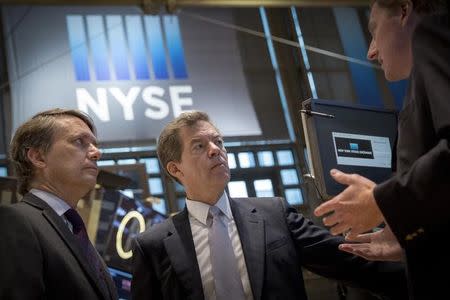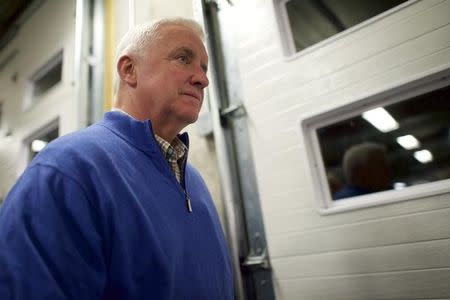In big U.S. governors' races, Democrat takes Pennsylvania
By Ellen Wulfhorst NEW YORK (Reuters) - A Democratic challenger toppled the Republican governor of Pennsylvania on Tuesday, one of the first blows to incumbents among the three dozen races for governors. Businessman Tom Wolf was declared the winner by NBC over Pennsylvania Governor Tom Corbett, one of several incumbents who struggled in their campaigns to defend their fiscal policies and keep their jobs. Corbett becomes the first incumbent governor in Pennsylvania history to fail to win a second term. Hot-button issues included taxes, gun control, abortion restrictions and healthcare costs in governors' races around the nation. For many voters, however, the economy is the central issue. An uneven recovery could prove the undoing of several incumbents, including the governors of Kansas and Pennsylvania, who are being held accountable for their states' fiscal woes. "We've had a very difficult economy for years and anyone in office is going to be held partly accountable, especially governors," said Larry Sabato, director of the University of Virginia's Center for Politics. "They're not called 'little presidents' for nothing." In Ohio, Republican Governor John Kasich was the first incumbent to secure re-election, according to a projection by CNN, while in Tennessee, Reuters/Ipsos projected Republican Governor Bill Haslam would be re-elected over Democrat Charles Brown. Both the Ohio and Tennessee outcomes had been expected. Polls closed in Florida, where Republican Governor Rick Scott faced off against Charlie Crist, a former Republican governor turned Democrat. The Crist campaign requested that voting be extended by two hours in Broward County due to voting difficulties, but the request was denied. Some Florida voters said their ballots were meant to punish the incumbent. "It's really a vote against Rick Scott," said Diane Darby, 45, a Miami Beach accountant who said she voted for Crist. Nathan Gonzalez, deputy editor of the Rothenberg Political Report, described the Florida race as "two unpopular politicians running against each other in a very large and expensive state." Party control of governorships is seen as critical in the 2016 White House contest, when candidates use governors to help build state-by-state support toward a possible nomination. CLOSE WISCONSIN RACE Potential 2016 presidential hopeful Scott Walker was among the incumbents seeking re-election on Tuesday in Wisconsin. The Republican became a champion of conservatives when he led the state's efforts to cut back the powers of public-sector unions. Recent polls had him running neck and neck with Democrat Mary Burke, a former business executive. Voter Greg Tellijohn, 63, a small business owner, said he was decidedly opposed to re-electing Walker. "Get rid of him. He's not for the people. He's not for health care. He turned down money for rapid transit. He doesn't compromise," Tellijohn said. Another voter, John Schumacher, 62, said he recently moved to Wisconsin and had made sure he was registered so he could cast a ballot for Walker. "I like the fact that he's not afraid to go against public opinion," Schumacher said. "He's not scared about what people are thinking or feeling." In Pennsylvania, Corbett, the Republican incumbent, had trailed badly in polls against his Democratic challenger, a wealthy businessman. Corbett came under heavy criticism for cuts in education funding and escalating pension liabilities during his tenure. "There's a strong anti-incumbent mode," said John Green, professor of political science at the University of Akron and director of the Ray C. Bliss Institute of Applied Politics. "Although the economy is definitely better than it was a year ago, it's not up to anybody's expectations, and governors are in a real hot spot," Green said. "They're the ones who have to cut programs or raise taxes." Going into Tuesday, Republicans held 29 governorships compared with the Democrats' 21. Fourteen governors' races were seen as toss-ups, and at least 10 incumbent governors are battling to save their jobs, experts projected. (Additional reporting by Saundra Amrhein in St. Petersburg, Bill Cotterell in Tallahassee, David Adams in Miami, Brendan O'Brien in Milwaukee and Todd Melby in Hudson, Wisconsin; Editing by Mary Milliken and Eric Walsh)



